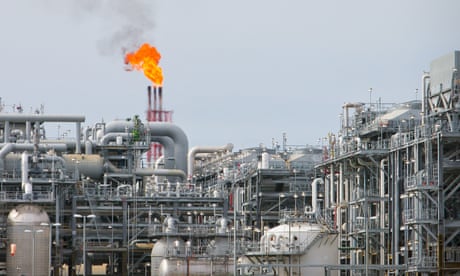- by foxnews
- 23 May 2025
Australia’s new gas projects to struggle financially after 2030 if 1.5C climate goal met, report says
Australia’s new gas projects to struggle financially after 2030 if 1.5C climate goal met, report says
- by theguardian
- 13 Apr 2022
- in news

Australia's new gas export developments are likely to struggle economically after 2030 if the world lives up to commitments to combat the climate crisis, according to a warning to major investors.
It suggests Australia's liquified natural gas (LNG) exports could fall slightly this decade before dropping sharply to less than 20% of current levels by 2050 if the world attempts to limit global heating to 1.5C, as agreed under last year's Glasgow climate pact.
The analysis by the Investor Group on Climate Change, a body that represents major institutional investors that manage more than $33tr in global assets, questions the viability of eight major fossil fuel developments that are yet to begin production and are scheduled to run until after 2050.
They include Woodside's $16bn Scarborough project in Western Australia, Origin Energy's plan to start extraction in the Northern Territory's Beetaloo Basin and Santos' greenfield gas development at Narrabri in New South Wales.
The analysis has been released shortly before Woodside and Santos are due to put their climate plans to shareholders for approval at upcoming annual general meetings.
Using modelling commissioned from global energy consultants Wood Mackenzie, the investor group found demand for gas exports was more likely to fall rapidly than domestic gas use. About three-quarters of gas extracted in Australia is sold overseas.
Its analysis found new developments could be economically challenged under different scenarios in which the world pushed to limit heating to 1.5C. It suggested investors were likely to be cautious about supporting further capital expenditure, particularly for projects that were scheduled to run past the 2040s and faced a higher risk of becoming stranded assets.
Rebecca Mikula-Wright, the group's chief executive, said investors would be concerned that the modelling indicated new gas developments would face "a range of complex and interconnected risks".
"Investors want to understand how Australian gas companies are assessing the risks associated with new projects, in particular the risk of accelerated demand decline as the world shifts to net zero," she said.
"As a country, we need to be part of a net zero emissions future by embracing a transition that is efficient, economically sensible and favours renewable energy sources over fossil fuels."
The modelling turns on the assumption that governments and investors will accelerate climate policies as promised under the 2015 Paris climate agreement and again at a UN conference in Glasgow last November. The world's leading climate science body, the Intergovernmental Panel on Climate Change (IPCC), last week suggested the goal of limiting heating to 1.5C was slipping from reach.
Australia's LNG export industry has grown dramatically from a small base over the past decade, with sales topping $50bn last year.
Gas is often described as having about half the greenhouse gas emissions of coal when burned, though studies have found its impact on the climate is greater than this due to leaks of methane - a short-lived but highly potent greenhouse gas - during extraction and transport.
But the gas industry lobby group, the Australian Petroleum Production and Exploration Association, argues demand for the fuel will remain strong as the world cuts emissions, in part due to the rise of carbon capture and storage (CCS). Australian government's have committed more than $4bn to developing CCS - capturing emissions and storing them underground - but it is yet to prove economically viable at scale.
Speaking last week, the association's outgoing chief executive, Andrew McConville, said: "Gas will continue to be a part of the future cleaner energy mix as a cleaner alternative that complements so many of the pathways to net zero by 2050."
The gas industry is strongly supported by the Morrison government, which committed nearly $1bn of public support as part of what it calls a "gas-fired recovery". Labor has not opposed support for gas industry expansion.
The investor group cited a recent report by the IPCC, which found gas use contributed to dangerous emissions levels and that global carbon pollution needed to peak by 2025 and be cut nearly in half by 2030 to keep alive a chance of limiting heating to 1.5C.
The analysis considered the impact of eight developments proposed by the energy companies Woodside, Santos, Origin and OilSearch that are scheduled to start production before the end of the decade, and projected demand for gas across Asia and Australia.
Depending on the path taken to try to limit global heating to 1.5C - principally, how quickly Australia embraces long-duration storage to back-up renewable energy - it found domestic use of gas would fall by either 50% or 13% by mid-century.
But it found LNG exports would fall dramatically after 2030 whether the world took an accelerated or more gradual path in cutting emissions. Projects that cost more and were harder to access geographically were likely to come under the greatest pressure.
- by foxnews
- descember 09, 2016
United Airlines flight returns to Hawaii after concerning message found on bathroom mirror; FBI investigating
United Airlines Flight 1169 to Los Angeles returned to Hawaii after a "potential security concern" aboard the plane. The FBI and police are investigating.
read more


